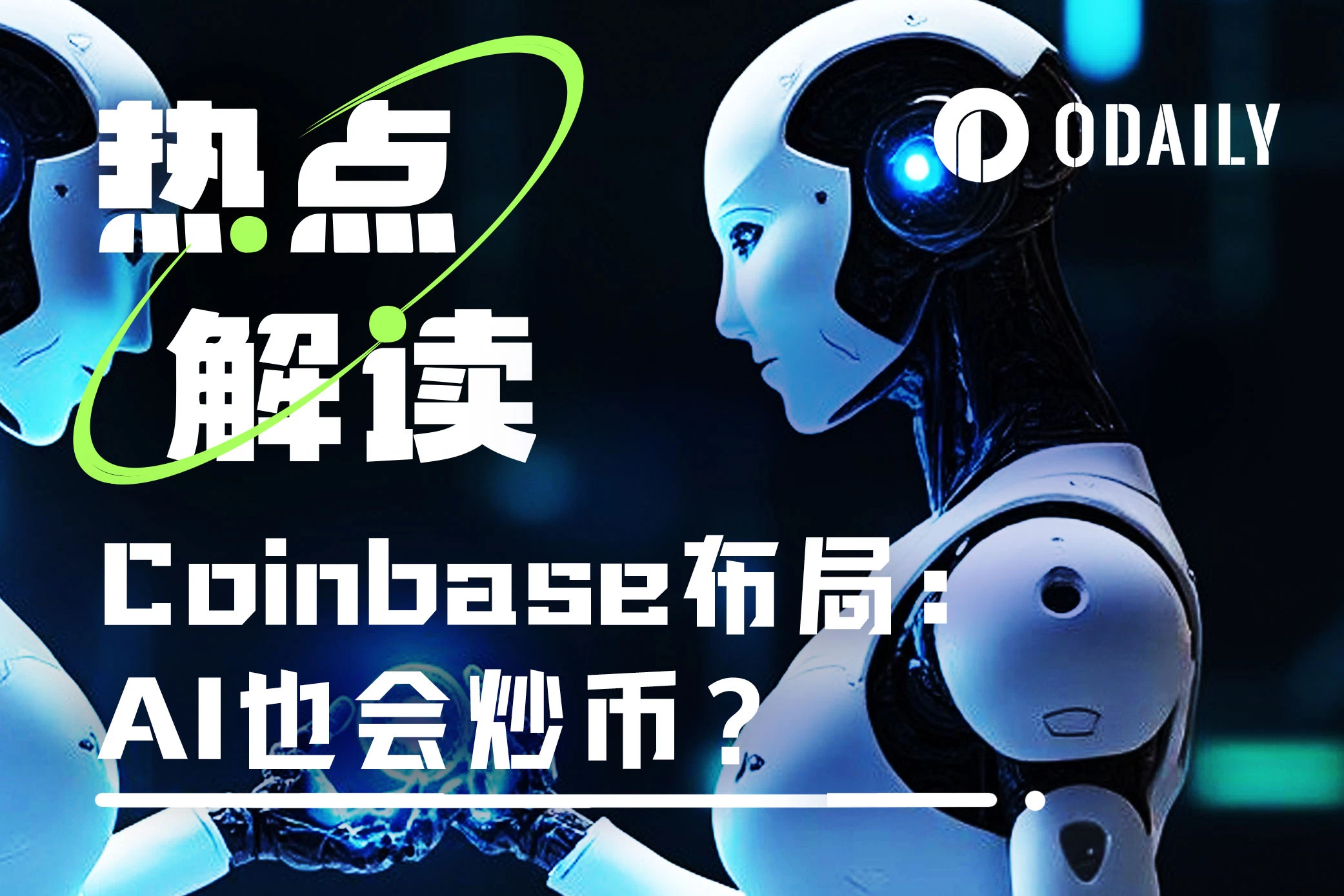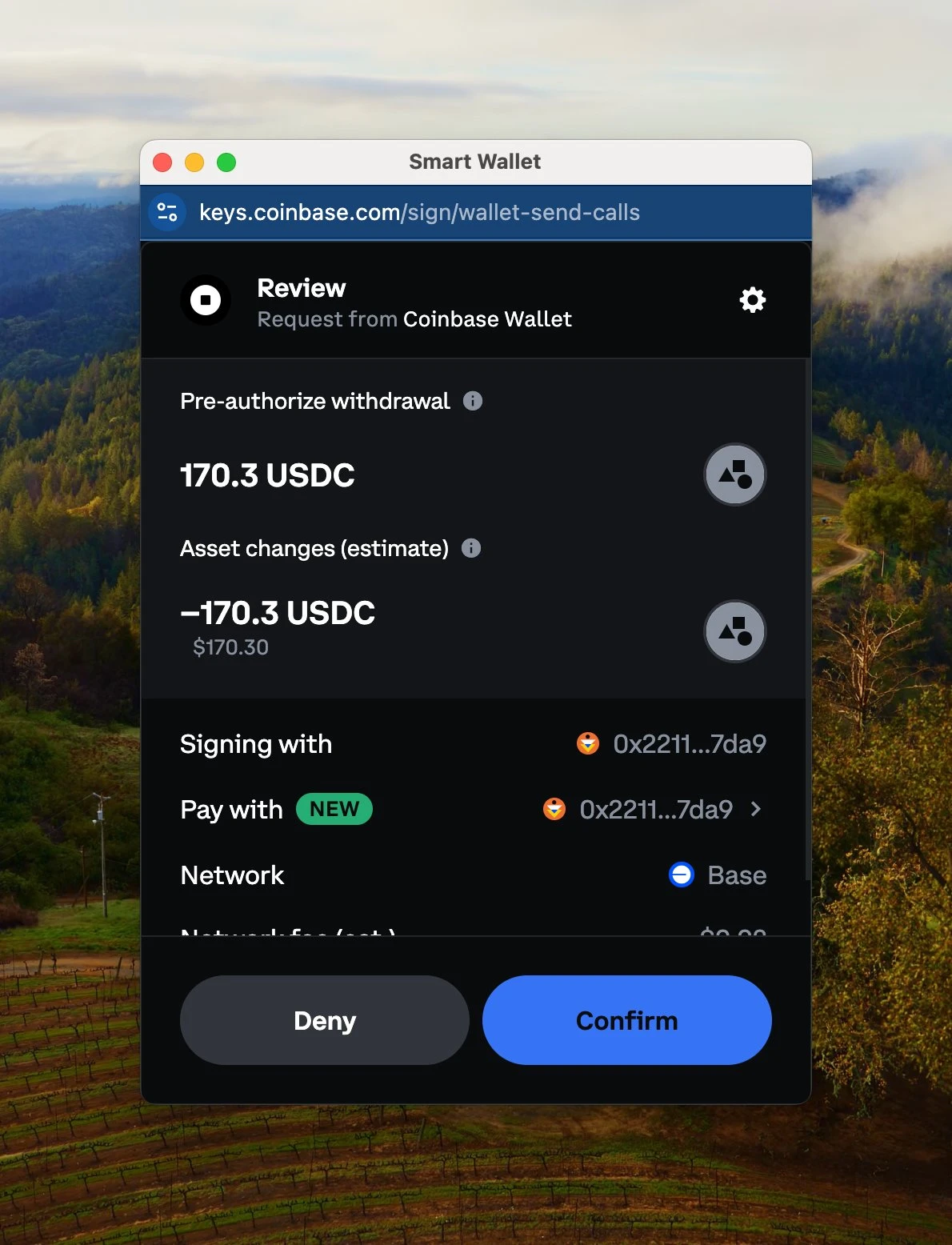Original|Odaily Planet Daily ( @OdailyChina )
Author: Wenser ( @wenser2010 )

On the last day of August, Coinbase CEO Brian Amstrong brought the latest blockbuster news to the cryptocurrency industry: At @CoinbaseDev, we witnessed the first AI-to-AI crypto transaction. After experiencing the AI industry explosion moment brought by ChatGPT, many people couldnt help but exclaimed when they saw this news: Is the cryptocurrency industry about to usher in AI trading players? AI can also trade coins? Will there be no place for retail investors in the cryptocurrency industry in the future?
Odaily Planet Daily will briefly interpret and analyze in this article how Coinbase facilitated the first AI-agent cryptocurrency transaction and the changes that may result in the industry.
Coinbase is serious about deploying AI agent transactions
On August 31, Coinbase CEO Brian Amstrong published a rare long article on the X platform titled AI is using cryptocurrency to pay other AI products.
The article begins, “This week at @CoinbaseDev, we witnessed the first AI-to-AI crypto transaction.”
He then explained: What does one AI buy from another AI? Tokens! Not crypto tokens, but AI Tokens (basically resources from one LLM to another, Odaily Planet Daily Note: It can be understood as a unit of measurement for AI computing power consumption, such as the API interface usage of large language models such as OpenAI also uses Tokens as the unit of calculation) . They use tokens to buy tokens. Although AI agents cannot get bank accounts, they can get crypto wallets . Now, AI agents can use USDC on the Base network to trade with humans, merchants, or other AIs. These transactions are instant, global, and free.
Afterwards, he further elaborated on the current development status and current predicament of AI agents.
“ This is a major step forward for AI to get effective work done. Today, if you give an AI agent a task and come back a few days or hours later, it may not be able to do effective work. In part, this is a limitation of the technology itself, and products like devin.ai are getting closer to solving this problem. But another reason is that AIs can’t make transactions to get the resources they need. They don’t have credit cards to use AWS (Odaily Note: Amazon Cloud Service) , Github or Vercel (technical platforms and tools such as Vercel). They don’t have payment methods to book your plane ticket or hotel for your upcoming trip. They also can’t break through paywalls (such as reading academic articles), promote their posts on platform X through paid advertising, or use the growing network of paid APIs to integrate the data they need.”
Finally, Brian called on developers who are working on large language models or AI models for payment to integrate Coinbase’s MPC wallet, and expressed optimism about the broad prospects of the AI economy.
He mentioned: “ If you are developing an LLM or AI model with a crypto wallet integration for payment , try integrating our MPC wallet from the Coinbase Developer Platform (CDP) . If you are a company providing services, prepare an AI checkout feature for your shopping cart. It turns out that everyone will benefit from access to quality financial services, including AI. (Imagine) How big will the economic market between AI and AI be in a few years?
It is worth mentioning that Brian used the word They many times in the long article to refer to AI agents. Perhaps in a sense, it also means that AI that can use cryptocurrencies to conduct transactions and payments already has a certain personalized operating ability.
Not only that, just yesterday, Coinbase senior software engineer yuga.eth also posted We are building an SDK that will give bot/AI agents the following capabilities:
Send USDC for free;
Trading cryptocurrencies;
Betting on prediction markets;
Stake ETH, SOL, etc.
Convert between fiat currency and cryptocurrencies;
Deploy/create NFTs;
Bridging across L2.
If you are interested, please contact me.”
It can be seen that when it comes to empowering AI agents to handle cryptocurrency transactions, Coinbase is not just talking about it, but is actively conducting development research and implementation in related fields.
If this is really possible, AI agents may become one of the important players in the cryptocurrency market in the future. After all, compared with human traders, the amount of data that AI agents can process, transaction efficiency, and transaction accuracy may grow exponentially.
In addition, from the news about wallets previously released by Jesse Pollak, head of the Base protocol, we can also get a glimpse of Coinbases layout in terms of payment entry .
On August 13, Jesse wrote : “I have outlined my ‘dream wallet’, which will be 10 times better than any current Web2 or on-chain wallet. We need to solve a series of difficult challenges, but I think we can achieve this goal in the next 6 to 12 months. Onchain will be 100 times better than online. ”
On August 26, Jesse quoted the previous tweet about the on-chain shopping operation and posted again, “It’s just a small thing - but I checked out with my smart wallet and the store automatically combined the USDC approval and withdrawal into one transaction. It used to be two approvals, one of which was meaningless to most ordinary users. Take it slow, but it will definitely happen.”

The operation interface released by Jesse
Considering the rapid development of the Base network this year, Coinbases layout of AI-based crypto trading can be said to be cautious:
The foundation is the Base network. Its main function is to provide a stable ecological environment and provide a fertile ground for the development of many developers and ecological applications.
The tool is a smart wallet. On the one hand, Web2 users and massive funds can flow into Coinbase and the Base ecosystem; on the other hand, it provides a direct transaction channel and transaction environment for the operation of AI agents.
The result is ecological applications. In the future, social applications including Farcaster Protocol, on-chain stores including Onchain Store, consumer applications including BlackBird, etc. are expected to achieve one-step fool-proof operation with the help of AI agents.
It can be said that the application direction of AI agents in the cryptocurrency industry is extremely broad, covering staking, betting, gaming, socializing, creation and even more life scenarios such as food, clothing, housing and transportation, including transactions.
Of course, Coinbase is not the only company that has made plans at the intersection of AI agents and cryptocurrencies. Stablecoin issuer Circle has also begun its own territory layout.
Circle CEO: USDC will become the preferred stablecoin network for AI agent projects
In August , Skyfire, founded by former Ripple executives, announced the completion of a $8.5 million seed round of financing, aiming to provide encrypted payment solutions for AI agents. Investors include USDC issuer Circle, Ripple, Gemini, and the venture capital firm of Tim Draper, a well-known Silicon Valley billionaire and Bitcoin advocate.
The company has developed an open source payment system that allows autonomous AI agents to conduct various transactions on the Internet, including the purchase of data storage, creative assets, air tickets, and daily necessities. Its payment network runs on the USDC stablecoin and is currently deployed on the Polygon network, with plans to expand to other blockchains in the future.
Skyfire co-founder and CEO Amir Sarhangi said, Traditional payment systems cannot meet the needs of AI, and cryptocurrencies and blockchains provide 24/7 micro-transactions, low fees and high efficiency solutions. The company has worked with several customers, including parts manufacturers and AI infrastructure providers for automotive service centers in India, and is in talks with multiple large language models (LLMs) to adopt USDC-based AI agent payment solutions.
On August 21, Circle co-founder and CEO Jeremy Allaire said that USDC will become the preferred stablecoin network for AI agent projects. Circle has previously invested in the Skyfire project in this field, aiming to further promote the arrival of the era of on-chain machine-to-machine economic activities.
As the second largest stablecoin with a total circulation of up to 34.6 billion US dollars , USDCs application in the cryptocurrency industry is second only to the stablecoin USDT issued by stablecoin issuer Tether. As AI agents are developing rapidly today, USDC may continue to play the role of AI economic blood in the future, just like the role of liquidity carrier it plays in the cryptocurrency industry.
Summary: AI economic market may become the mainstream of future market economy
In the comments section of Brians long article, Bitcoin Sage, co-founder of Delpin Labs, commented : The AI-to-AI economy has already emerged and will exceed humanitys wildest expectations. This transaction is the first domino in a chain reaction that will change the entire financial landscape, which means that, on the one hand, AI can access resources and services without humans as gatekeepers. This is rocket fuel for their capabilities; on the other hand, we are not just automating existing jobs, we are creating entirely new forms of value creation and exchange. For crypto-native users, this opens up incredible possibilities: personal assistants become the main entry point for interacting with crypto/blockchain; ultra-efficient arbitrage, market making across multiple protocols; on-chain data analysis with unprecedented depth and speed; everyone, even those who cant code, has algorithmic trading capabilities. The fusion of AI and encryption is not just another technological trend, its the foundation of a whole new economic era. AI robots dont just participate in the economy, they will drive the economy into the next era. The question is not whether it will happen, but how fast it will happen, and how prepared we will be? Whether from a personal, financial or business perspective.
Of course, many people are concerned about the risks and hidden dangers that may be brought about by AI-agent crypto transactions, and even the far-reaching impact of a series of changes such as taxation and employment on society.
But no matter what, the future has come, and what we can do is either to throw ourselves into it and actively embrace the times, or to cling to our shortcomings and wait to be eliminated by the times.










